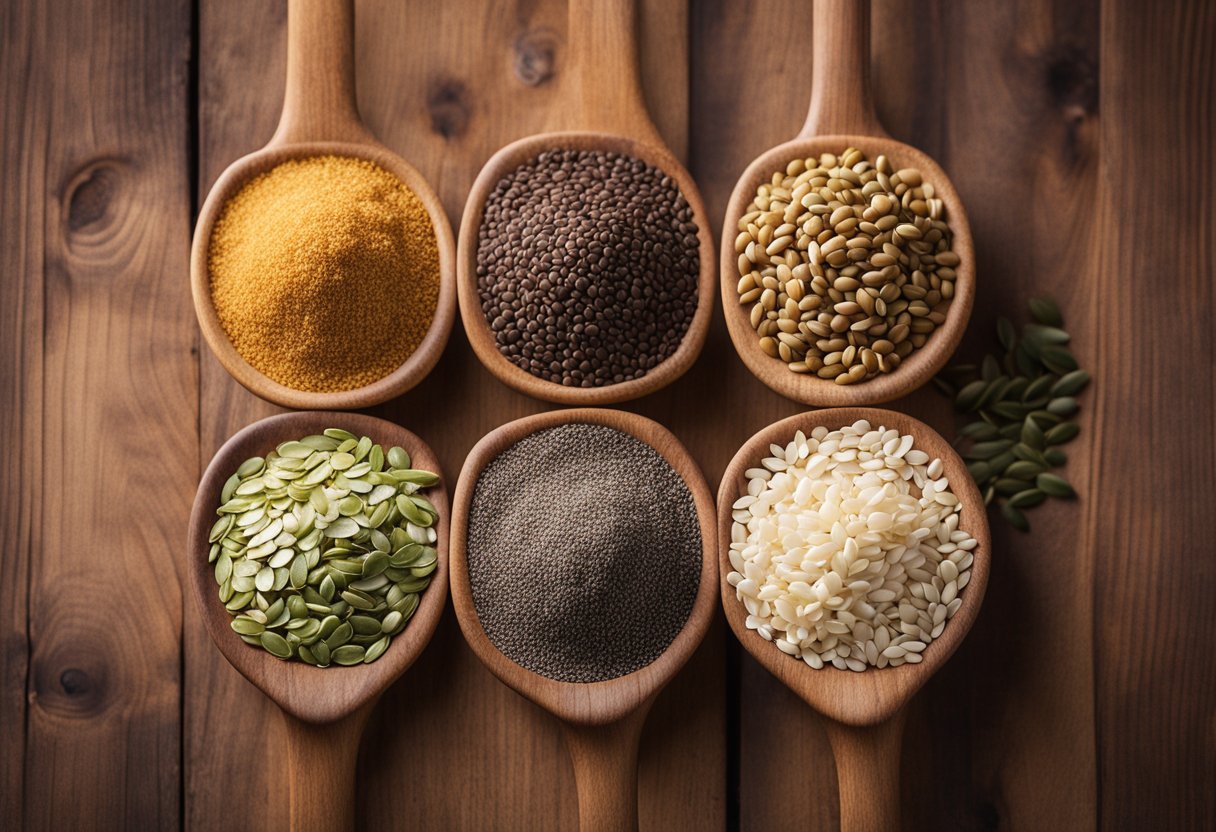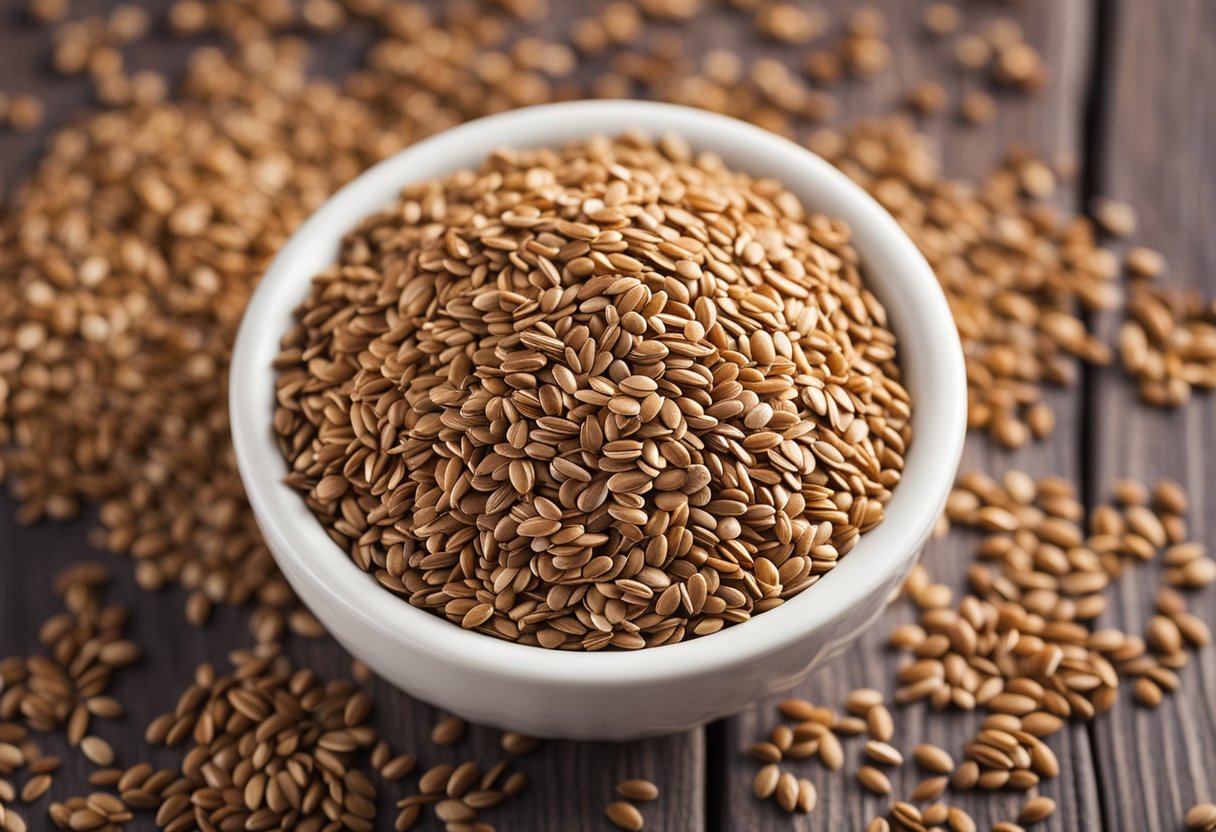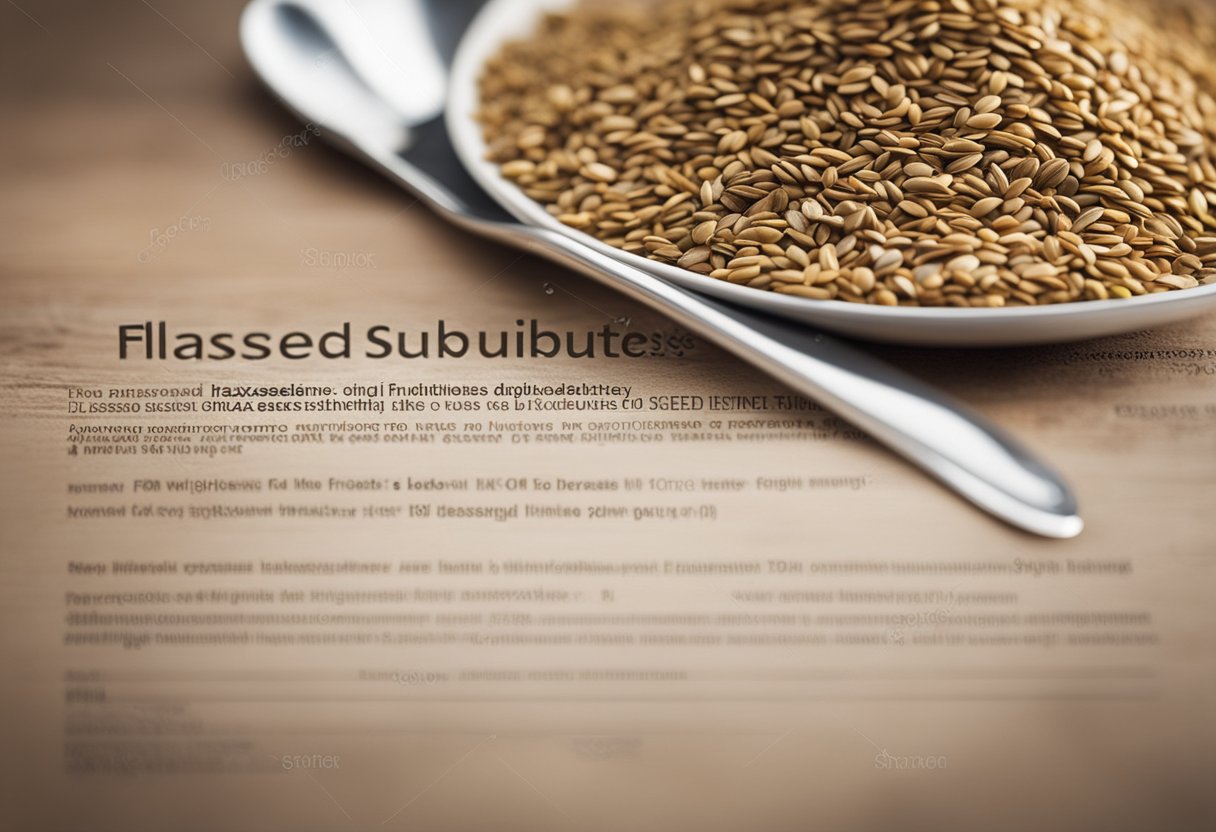As someone who has been incorporating flaxseed into my diet for its numerous health benefits, I know how important it is to have a good understanding of this ingredient.
Flaxseed is a great source of fiber, protein, and omega-3 fatty acids, making it a popular addition to smoothies, baked goods, and other recipes. However, it’s not always easy to find flaxseed or to incorporate it into every meal. That’s where flaxseed substitutes come in.

Whether you’re looking for a replacement for flaxseed due to dietary restrictions or simply because you don’t have any on hand, there are many alternatives to choose from. From almond meal to chia seeds, each substitute has its own unique flavor and nutritional profile.
Understanding the different options available and how to use them can help you make the most of your recipes and ensure you’re getting the nutrients you need.
Key Takeaways
- Flaxseed is a nutrient-dense ingredient that can be difficult to find or incorporate into every meal.
- There are many flaxseed substitutes available, each with its own unique flavor and nutritional profile.
- Understanding the different options and how to use them can help you make the most of your recipes and ensure you’re getting the nutrients you need.
Understanding Flaxseed
Flaxseed, also known as linseed, is a superfood that has been used for its nutritional benefits for thousands of years. It is a small, brown seed that is rich in fiber, protein, and omega-3 fatty acids. Flaxseed is also a good source of manganese, copper, potassium, and antioxidants.
One of the main benefits of flaxseed is its high fiber content. Flaxseed is a great source of both soluble and insoluble fiber, making it an excellent addition to any diet.
Soluble fiber helps to lower cholesterol levels, while insoluble fiber promotes regular bowel movements and helps to prevent constipation.
Flaxseed is also a good source of healthy fats, including omega-3 fatty acids. These essential fatty acids are important for maintaining heart health and reducing inflammation in the body. Flaxseed is also a good source of iron, magnesium, and vitamin E.
In addition to its nutritional value, flaxseed is also easy to incorporate into your diet. It can be added to smoothies, oatmeal, yogurt, or baked goods. It can also be used as a substitute for eggs or oil in recipes.
Overall, flaxseed is a healthy and nutritious addition to any diet. It is a great source of fiber, protein, and healthy fats, as well as a variety of vitamins and minerals.
Whether you are looking to add more nutritional value to your diet or simply looking for a tasty and versatile ingredient, flaxseed is definitely worth considering.
Flaxseed in Cooking
As someone who enjoys cooking and baking, I often use flaxseed in my recipes. Flaxseed is a versatile ingredient that can be used in a variety of dishes, from smoothies to soups to baked goods.
One of the most common uses for flaxseed is as an egg substitute. To use flaxseed as an egg substitute, simply mix one tablespoon of ground flaxseed with three tablespoons of water.
Let the mixture sit for a few minutes until it thickens, then use it in place of one egg in your recipe.
Flaxseed can also be used as a substitute for oil or butter in baking. To substitute flaxseed for oil or butter, use three tablespoons of ground flaxseed in place of one tablespoon of oil or butter. This substitution works best in recipes that call for a small amount of oil or butter.
In addition to being a great substitute, flaxseed can also be used as a meal or flour in recipes. Flaxseed meal can be used in place of breadcrumbs in meatloaf or as a coating for chicken or fish.
Flaxseed flour can be used in place of regular flour in recipes, although it may require additional liquid to achieve the right consistency.
Flaxseed can also be used in breakfast dishes such as oatmeal and cereal. Simply sprinkle ground flaxseed on top of your oatmeal or cereal for a boost of nutrition.
Finally, flaxseed can be used as a crust for pies and other baked goods. Mix ground flaxseed with almond flour and a sweetener of your choice, then press the mixture into a pie dish or muffin tin. Bake the crust for a few minutes before adding your filling.
Overall, flaxseed is a versatile ingredient that can be used in a variety of dishes. Whether you’re looking to substitute eggs or oil in your recipes or add a boost of nutrition to your meals, flaxseed is a great option to consider.
Flaxseed as a Binding Agent
As a vegan or vegetarian, finding a suitable egg replacement can be challenging. Fortunately, flaxseed is a versatile ingredient that can be used as a binding agent in baking recipes.
Ground flaxseed, also known as flaxseed meal or flax meal, is a popular binder that can replace eggs in recipes.
To make a flax egg, mix one tablespoon of ground flaxseed with three tablespoons of water and let it sit for a few minutes until it thickens. This mixture can be used in place of one egg in most recipes.
Flaxseeds have binding properties due to the mucilage found in the outer layer of the seed. When ground, the seeds release this mucilage, which acts as a thickening agent and helps to bind ingredients together.
The whole seed can also be used for this purpose, but it may not be as effective as ground flaxseed.
Ground chia seeds are another popular egg replacement that can be used as a binder in recipes. Like flaxseed, chia seeds contain mucilage and have thickening properties.
To make a chia egg, mix one tablespoon of ground chia seeds with three tablespoons of water and let it sit for a few minutes until it thickens.
In addition to being a binder, flaxseed flour can also be used as a thickener in recipes. It can be used to thicken sauces, soups, and stews, and can also be used in place of wheat flour in recipes. Flaxseed flour is coarse and has a nutty flavor, so it may not be suitable for all recipes.
Overall, flaxseed is a versatile ingredient that can be used as a binding agent and thickener in recipes. Whether you are looking to replace eggs in baking or thicken a sauce, flaxseed can be a great option.
Flaxseed in Dietary Needs

As someone who follows a plant-based diet, I know how important it is to find substitutes for animal-based ingredients.
Flaxseed is a great option for vegans and vegetarians as it is a rich source of omega-3 fatty acids, which are typically found in fish. Omega-3s are essential for brain function and can also help reduce inflammation in the body.
For those who are gluten-free, flaxseed can be a great substitute for wheat flour. Ground flaxseed can be used in place of flour in recipes for baked goods like bread and muffins.
Not only does this add extra fiber to the recipe, but it also helps to bind the ingredients together.
Flaxseed is also a great option for those following a keto diet. It is low in carbs and high in healthy fats, making it a great addition to keto-friendly recipes.
Ground flaxseed can be used as a thickening agent in sauces and dressings, and can also be used as a substitute for breadcrumbs in recipes like meatballs and meatloaf.
For vegetarians and vegans who are looking for an egg substitute, flaxseed can be used to make a flax egg.
Simply mix one tablespoon of ground flaxseed with three tablespoons of water and let it sit for a few minutes until it forms a gel-like consistency. This can be used in place of eggs in recipes like pancakes, waffles, and baked goods.
Overall, flaxseed is a versatile ingredient that can be used in a variety of recipes to meet different dietary needs. Whether you are vegan, gluten-free, keto, or just looking to add some extra fiber and healthy fats to your diet, flaxseed is definitely worth considering.
Flaxseed Substitutes
As a nutritionist, I often recommend flaxseed as a supplement due to its high fiber and omega-3 fatty acid content. However, if you’re looking for alternatives to flaxseed, there are several options that can provide similar nutritional benefits.
Chia seeds are one of the most versatile flaxseed substitutes. They are high in fiber and omega-3 fatty acids, making them an excellent choice for use as a binder or egg replacement in recipes. Ground chia seeds can also be used as a flaxseed meal substitute in baking.
Wheat germ is another healthy baking substitute for flaxseed. It is rich in fiber, protein, and essential nutrients like vitamin E. It can be used as a one-to-one replacement for flaxseed in recipes.
Hemp seeds are also a good alternative to flaxseed. They are high in protein and omega-3 fatty acids, making them a great choice for vegans and vegetarians. Hemp seeds have a slightly nutty flavor and can be used as a topping for salads, yogurt, or oatmeal.
Almond meal is a protein-packed alternative to flaxseed. It lacks the protein that we need, but it is a great source of healthy fats, fiber, and essential nutrients. It can be used as a one-to-one replacement for flaxseed in recipes.
Yogurt and silken tofu can be used as flaxseed substitutes in recipes that call for eggs or oil. They add moisture and texture to baked goods and can be used as a one-to-one replacement for flaxseed in recipes.
Psyllium seeds and psyllium husk are popular substitutes for flaxseed. They are a source of both soluble and insoluble fiber, which can play an important role in gut health and regularity.
Psyllium seeds can be used as a flaxseed meal substitute in baking, while psyllium husk can be used as a binder in recipes.
Quinoa is another healthy baking substitute for flaxseed. It is high in protein, fiber, and essential nutrients like iron and magnesium. It can be used as a one-to-one replacement for flaxseed in recipes.
Golden flaxseed is a neutral-flavored alternative to regular flaxseed. It has a milder taste and can be used in recipes that call for flaxseed. It is also a good source of omega-3 fatty acids and fiber.
In summary, there are many flaxseed substitutes available that can provide similar nutritional benefits. Chia seeds, wheat germ, hemp seeds, almond meal, yogurt, tofu, psyllium, quinoa, and golden flaxseed are all healthy alternatives to flaxseed.
Using Flaxseed Substitutes
As someone who often uses flaxseeds in my recipes, I have found that there are times when I run out of them or simply want to try something new. In these situations, it is helpful to know what substitutes are available.
When looking for a flaxseed substitute, it is important to consider what role the flaxseed plays in the recipe. For example, if you are using flaxseeds as an egg substitute, you will want to find a substitute that has similar binding properties.
Almond meal is a great option for this, as it is a protein-packed alternative that can act as an egg substitute and food binder.
If you are using flaxseeds to add moisture to a recipe, you can try using applesauce, mashed bananas, or yogurt instead. These ingredients can add moisture to your recipe without altering the flavor too much.
Another thing to consider when using flaxseed substitutes is the moisture content of the substitute. Flaxseeds are high in soluble fiber, which can help with constipation and heart health.
Some substitutes, like chia seeds, also have high fiber content and can be used in place of flaxseeds in recipes.
One lesser-known substitute for flaxseeds is psyllium husk, which comes from the plantago plant. This ingredient is often used as a laxative, but it can also be used as a binding agent in recipes.
It is important to note that psyllium husk absorbs a lot of liquid, so you may need to adjust the amount of liquid in your recipe accordingly.
Finally, if you are looking for a gluten-free option, you can try using rice flour or ground rice as a substitute for flaxseeds. These ingredients can be used as a binding agent in recipes and can add a subtle flavor to your dish.
Overall, there are many options available when it comes to finding a flaxseed substitute. By considering the role that flaxseeds play in your recipe and the properties of the substitute, you can find a substitute that works best for you.
Frequently Asked Questions

What can I use as a substitute for flaxseed in energy balls?
There are several options to consider as a substitute for flaxseed in energy balls. Chia seeds, hemp seeds, and pumpkin seeds are all great alternatives that provide similar nutritional benefits.
You can also try using sesame seeds or sunflower seeds for a different flavor profile.
Can I use chia seeds instead of flax seeds in baking?
Yes, chia seeds can be used as a substitute for flax seeds in baking. Chia seeds are high in fiber and have similar binding properties to flax seeds, making them a great alternative.
However, keep in mind that chia seeds have a slightly different texture and taste, so the end result may be slightly different.
What is the ratio of flaxseed to chia seeds?
The ratio of flaxseed to chia seeds depends on the recipe and the desired outcome. As a general rule of thumb, you can use a 1:1 ratio of ground flaxseed to ground chia seeds.
However, you may need to adjust the ratio based on the specific recipe and the consistency you are trying to achieve.
What can I use as a substitute for flaxseed meal, such as psyllium husk?
Psyllium husk is a great substitute for flaxseed meal in many recipes. It is high in soluble fiber and has a similar binding effect to flaxseed meal.
Other alternatives include oat bran, coconut flour, and almond flour. However, keep in mind that these substitutes may affect the texture and flavor of the final product.
What role does flaxseed play in baking?
Flaxseed is often used as a binding agent in baking recipes. It is high in soluble fiber and forms a gel-like substance when mixed with liquid, which helps to hold ingredients together. Flaxseed also adds a nutty flavor and a slight crunch to baked goods.
What other seeds are similar to flax seeds?
Chia seeds, hemp seeds, and pumpkin seeds are all similar to flax seeds in terms of nutritional benefits and texture. Sesame seeds and sunflower seeds can also be used as substitutes, although they have a slightly different flavor profile.







